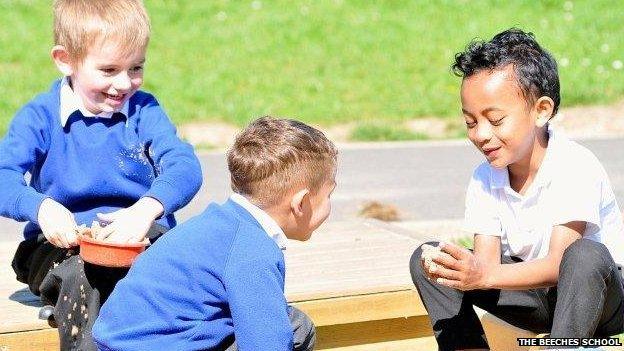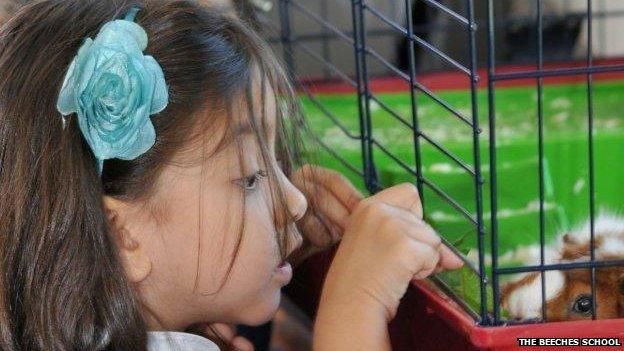The anxious scramble to get a school place
- Published

It is an anxious day for parents all over England as the letters arrive allocating primary school places.
If you live in a city where the population is booming, like Peterborough, competition for popular schools has increased.
Speaking to parents there this week, everyone knows pressure on schools generally has been mounting.
Such is the difficulty in finding places that some families have to drop children off each morning at four different schools.
It is not unknown for twins to be separated, starting in reception classes in different schools.
Between 2010 and 2015, the number of primary school pupils has increased by 24%.
The change has been driven by a relatively high birth rate and by a new wave of immigration.
Increased demand
The Beeches Primary School stands in a grid of small terraced streets close to the city centre.
There was a time when most of the children were from second or third generation British Pakistani families.
But many of those families have now moved out of the inner city as new arrivals from Eastern Europe have moved in to the cheap rented accommodation in the area.

Like many other council-run schools in the city, the Beeches has expanded during the last five years and now takes 90 children into reception classes each year.
They expect to have a waiting list for places and to face more requests to squeeze extra children in as they arrive during the year.
Head teacher Tim Smith says the old school logbooks record concerns about coping with much earlier waves of Italian immigrants.
So in some ways it is not a new problem, but still one that presents him with a dilemma.
He can sometimes find a space for one child in a family but not another in a different year group.
"The difficulty for us is we're judged on our standards. To take on a larger group of children mid-year can be very disruptive, particularly if they're children that haven't been to school before or don't speak English."
He laughs ruefully as he tells me it can be a threat to the school, and a head teacher's career, if standards dip.
For parents too there are pressures.
Picking up his daughter from the reception class at the school, Irfan Ullah tells me each day he has to dash across the city centre as his other child is in a different school.
He has 15 minutes to get them both to school on time.
New places
The city is quite simply running to keep up with the number of children.
At the city council offices Jon Lewis tells me they have expanded every nook and cranny of schools they can to create 4,501 places in the last five years.

The city council has taken a pragmatic view of recent government policy assuming any new school should be opened as a free school.
They have worked with academy chains interested in expanding in Peterborough.
Even so, just 13% of the new places created have come from schools that were academies at the time of the expansion.
Labour says the pressure on school places has been made worse because of the priority given to funding the opening of free schools.
Under the coalition, the presumption has been that councils can no longer open a new school they directly manage.
But education ministers have argued the free schools policy has given parents and community groups a greater say in where and how schools should be opened and run.
In the end, the legal duty to make sure each child has a place to start school by September rests with the council.
What has happened in Peterborough has been repeated in other communities around England.
And there is more pressure on the horizon with primary school pupil numbers expected to grow nationally by 9% by 2023.
The capital spending in the education budget fell by 34% between 2010-11 and 2014-15 according to the economists at the independent Institute for Fiscal Studies.
So expect more debate about how to pay for the classrooms for the children coming through the system.